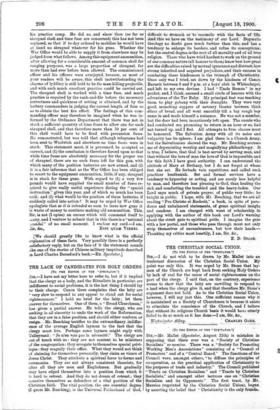fl-LE LACK OF CANDIDATES FOR HOLY ORDERS.
[To THE EDITOR OP THE "SPECTATOR..")
318,—I have not my letter here to refer to, but if it implied that the clergy as a body, and the Ritualists in particular. are indifferent to social problems, it is the last thing I should lay to their charge. Canon Gore complains that the laity are " very slow to respond to any appeal to stand out for social righteousness." I hold no brief for the laity; let them answer for themselves. One of them, a " Broad Churchman," has given a partial answer. He tells the clergy, who are seeking in all sincerity to undo the work of the Reformation, that they are in a false position, and should either conform or resign: Mr. Beaching testifies to the extraordinary .indiffer- ence of the average English layman to the fact that the clergy must live. Perhaps some laymen might reply with Talleyrand : Je n'en vois pas la necessite." The clergy are uut of touch with us : they are not content to be ministers of the congregation : they arrogate to themselves special privi- leges : they magnify their office. What they would not think of claiming for themselves personally, they claim as vicars of Jesus Christ. They attribute a spiritual force to forms and ceremonies. They are not always consistent theorists, for after all they are men and Englishmen. But gradually they have edged themselves into a position from which it is hard to retreat. And they do not dream of retreat; they conceive themselves as defenders of a vital position of the Christian faith. The vital position, the one essential dogma (I quote Mr. Beeching), is the Universal Fatherhood of God,
difficult to stomach or to reconcile with the facts of life. And this we have on the testimony of our Lord. Dogmatic theology no doubt goes much further than this, and has a tendency to enlarge its borders, and refine its conceptions; but the central dogma is the root of all morality and of all true religion. Those who have tried hardest to work on the ground of our common nature (all honour to them) know best how great are the difficulties raised by mutual ignorance and distrust, how strong inherited and acquired prejudices, and their success in combating these hindrances is the triumph of Christianity. Once only was I tried, set down by the kindness of Canon Barnett between 8 and 9 p.m. at a boys' club in Whitechapel, and left to my own devices. I had " Uncle Remus " in my pocket, and, I think, amused a small circle of hearers with the adventures of the Tar Baby. My principal feat was teaching them to play gobang with their draughts. They were very good, munching suppers of savoury bloater between thick slices of bread, and all went smoothly till a big rough boy came in and made himself a nuisance. He was not a member, but the door had been incautiously left open. The curate who had conducted me, promising to return in an hour or so, had not turned up, and I fled. All attempts to fuse classes must be honoured. The Salvation Army with all its noise and vulgarity has its sphere; I am glad there is a Church Army, but the Salvationists showed the way. Mr. Beeching accuses me of depreciating worship and magnifying philanthropy. It is true, I believe, that God is best served by serving man, and that without the love of man the love of God is impossible, and for this faith I have good authority. I can understand the attitude of Mary at Bethany, but I do not forget at whose feet she sat. He forbade vain repetitions, and called such practices heathenish. Set and formal services have a tendency to hypocrisy or acting, and are surely less helpful to man, and therefore less pleasing to God, than healing the sick and comforting the troubled and the heavy-laden. Our Lord says much of private prayer, of public very little; he taught in public. I hope, with Mr. Beeching, that we are all reading " Pro Christo et Ecclesia," a book, in spite of para- doxes and unbalanced statements, of great spiritual insight and candour. I am charged with want of scholarship in applying with the author of this book our Lord's warning about the strait gate to spiritual pride. I imagine the gate with a low portal, and those who pass through must not only strip themselves of encumbrances, but bow their heads.— Thanking my critics most heartily, I am, Sir, &c., E. D. STONE.


































 Previous page
Previous page